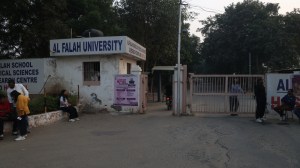Click here to join Express Pune WhatsApp channel and get a curated list of our stories
One twin lost, Pune hospital’s extraordinary efforts save other
Not willing to take any chances after the loss of their baby boy two years ago, Roshan decided to return to Pune and brought his wife to Jehangir Hospital.
 Despite Roshan's meager monthly salary, he sought financial aid, and the hospital authorities assisted him as the baby required a prolonged three-month stay.
Despite Roshan's meager monthly salary, he sought financial aid, and the hospital authorities assisted him as the baby required a prolonged three-month stay. Roshan Kumar and his wife pregnant Sudha were horrified when they learned that one of their soon-to-be-born twins did not have a heart and the torso not fully formed. The 25-year-old Roshan, who works as a cook in Pune, consulted doctors who advised him to take his wife to tertiary hospitals in Mumbai or Kolkata.
Not willing to take any chances after the loss of their baby boy two years ago, Roshan decided to return to Pune and brought his wife to Jehangir Hospital. “While the other infant did not survive, another twin – daughter Sharada – is doing well,” he shared.
Dr. Sagar Lad, Consultant Senior Pediatrician and Neonatal Intensivist, stated that the goal of the multi-specialty medical team was the survival of the infant. Born prematurely at 26 weeks, the baby weighed only 760 grams and faced multiple complications.
“The couple traveled all the way from Bihar, and the mother was at 26 weeks of gestation with a twin pregnancy. One baby was growth-restricted due to interconnected blood vessels, and the second baby had a rare abnormality called Fetal Acadia. The second baby’s upper body, including the chest, upper limbs, neck, and head, was not formed.
 Upon arriving at the hospital, the mother was in an advanced stage of labor, and the first baby was immediately delivered, Dr Angom said.
Upon arriving at the hospital, the mother was in an advanced stage of labor, and the first baby was immediately delivered, Dr Angom said.
Additionally, there was a large fluid-filled swelling where the chest should have been,” explained Dr. Jyotsna Angom, Consultant Obstetrician and Gynecologist at Jehangir Hospital.
Upon arriving at the hospital, the mother was in an advanced stage of labor, and the first baby was immediately delivered, Dr Angom said. However, the second twin was stuck due to the large swelling. Under ultrasound guidance, decompression was performed, resulting in the delivery of an extremely abnormal baby. Dr Lad highlighted the initial challenge of underdeveloped lungs, which caused breathing difficulties. Ventilator support and surfactant medication were administered to expand the airways and improve respiratory function. Despite intermittent symptoms, the baby required ongoing ventilator support for survival. After a month, the baby transitioned to CPAP support, and approximately two months of oxygen support were needed.
“One notable complication that arose during treatment was Patent Ductus Arteriosus (PDA), a heart defect commonly observed in premature infants. Conservative measures, including medication to reduce fluid buildup and alleviate pressure on the heart, helped in the closure of the duct,” added Dr Lad.
The medical team also faced challenges related to feeding intolerance due to gastroesophageal reflux. Moreover, due to the prolonged period of oxygen support, extreme prematurity, and low birth weight, the baby developed retinopathy of prematurity (ROP), a condition affecting the eyes that could lead to blindness. “The baby was screened and was given timely treatment in the form of retinal laser in both eyes and intravitreal injections, given twice in both eyes,” said Dr Vrushali Athawale, consultant ophthalmologist at Jehangir Hospital.
Despite Roshan’s meager monthly salary, he sought financial aid, and the hospital authorities assisted him as the baby required a prolonged three-month stay. The baby was finally discharged, weighing 1.9 kg. Dr. Lad emphasized the importance of comprehensive and compassionate care for managing complex medical conditions in premature infants, a sentiment echoed by Vinod Sawantwadkar, CEO of Jehangir Hospital.
Click here to join Express Pune WhatsApp channel and get a curated list of our stories








